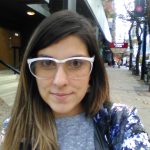
As a second generation of fellows of the Samuel H. Kress Foundation and the DLF for cross-pollinators – museum professionals seeking for expanding knowledge in digital technologies and trends– I am honored to get the opportunity to be a part of this big digital community. Regarding European standards and particularly digital strategies in my country, which are still in progress and at the very beginning, I learned so much more than I could ever imagine.
Having opportunity to learn about newest trends in digital collections and discuss about different barriers in processing and collecting of metadata are priceless not only for me and my career, but also for my working community and the necessity to change and develop digital working environment.
Besides traditional lectures and workshops at the Forum, the most useful and interesting for me were snapshots. It was a unique possibility to see the creation of specific digital collections and discover true essences of different projects – to see its beginning, processing and finalization.
It was also a true revelation of newest platforms and schemas for programs for digital data[pullquote1 align=”right”]Regarding European standards and particularly digital strategies in my country, which are still in progress and at the very beginning, I learned so much more than I could ever imagine.[/pullquote1]processing. For the first time in my professional career, I had the opportunity to find out more about some programs used in American libraries and museums, which I did not hear about before or didn’t have chance to use.
This conference made me also think more about some important things such as digital preservation. Although we are at the beginning of making our digital data, we have to think about strategies of preservation even now, so we do not have to face some potential problems in the future.
There were also different discussions about open access of digital information, which I found very useful for my own dilemmas. There is a lot of questioning and confusion about this theme in my own country and even in the institution I am working in, so these discussions help me find some answers and possible solutions of our own problems regarding open access and evaluation of this kind of information.
However, the strongest impression of the Conference, beside the perfect organization, was people. Having opportunity to meet such a great number of professionals at the same place is surely a significant opportunity. I did not have a chance to experience these kinds of positive energies, willingness to help, talk, advise, and share knowledge, until this conference happened, and that is the priceless impression I brought back with me.
In order to remain on this path of positive thoughts and people, I heartily recommend the mentoring program as a great opportunity to not only meet some new people in relaxing environment, but also to exchange experience and connect with true professionals with whom you can consult about specific themes and different fields of work.
Hopefully, I will have the opportunity again to be a part of this special community and maybe in the future be a presenter at the Conference; until then I am saving the date of the next event and strongly recommend to “digital” professionals to take part in this unique event.
